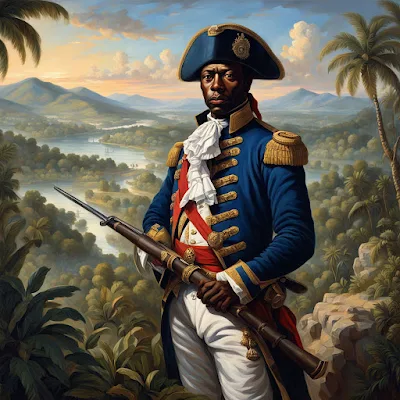Comprehensive Guide to the Haitian
Revolution: History, Causes & Impact
Introduction
The Haitian Revolution is one of the most significant
and impactful events in world history. It was the first and only successful
slave revolt that led to the establishment of an independent nation, Haiti, in
1804. The revolution not only marked the end of French colonial rule in
Saint-Domingue but also had a profound impact on the abolition of slavery in
the Western Hemisphere. This article explores the origins, key figures, major
battles, and the lasting legacy of the Haitian Revolution, providing a detailed
understanding of its importance in global history.
Origins of the Haitian Revolution
French Colonial Rule in Saint-Domingue
Saint-Domingue, now known as Haiti, was a French
colony located on the western part of the island of Hispaniola. By the late
18th century, it was the most profitable colony in the world, thanks to its
production of sugar, coffee, and indigo. However, this wealth was built on the
backs of enslaved Africans, who made up the majority of the population and
endured brutal conditions under French rule.
The Impact of the French Revolution
The French Revolution, which began in 1789, had a
significant influence on the Haitian Revolution. The ideas of liberty,
equality, and fraternity resonated with the enslaved population of
Saint-Domingue, sparking hopes of freedom and equal rights. The revolution in
France also led to political instability, which weakened French control over
its colonies.
The Enslaved Population and Their Conditions
The enslaved population in Saint-Domingue lived in
inhumane conditions, with long hours of labor, harsh punishments, and little to
no rights. This created a deep sense of resentment and a strong desire for
freedom among the enslaved, setting the stage for the revolution.
The Spark of the Revolution
The Influence of the French Revolution on Saint-Domingue
The French Revolution brought new ideas and
opportunities for change to the colonies. In Saint-Domingue, free people of
color and enslaved Africans began to organize and demand their rights. The
Declaration of the Rights of Man and of the Citizen, adopted by the French
National Assembly in 1789, became a rallying point for those seeking freedom in
Saint-Domingue.
The Role of Vodou Ceremonies in Mobilization
Vodou, a religion practiced by many enslaved Africans
in Saint-Domingue, played a crucial role in the revolution. Vodou ceremonies
provided a space for enslaved people to gather, plan, and unite against their
oppressors. The most famous of these ceremonies took place on August 14, 1791,
at Bois Caïman, where leaders like Dutty Boukman called for a rebellion against
the French.
The Night of August 22, 1791: The Beginning of the Uprising
The Haitian Revolution officially began on the night
of August 22, 1791, when enslaved Africans in the northern part of
Saint-Domingue rose up against their masters. They burned plantations, killed
slave owners, and declared their intention to fight for freedom. This uprising
quickly spread across the colony, leading to a full-scale revolution.
Key Figures in the Haitian Revolution
Toussaint L'Ouverture: The Leader of the Revolution
Toussaint L'Ouverture is perhaps the most well-known
figure of the Haitian Revolution. A former slave, L'Ouverture became the leader
of the revolutionary forces and played a crucial role in the fight for
independence. His military and diplomatic skills helped secure victories
against the French, Spanish, and British forces.
Jean-Jacques Dessalines: The First Emperor of Haiti
Jean-Jacques Dessalines, another key leader, succeeded
Toussaint L'Ouverture after his capture by the French. Dessalines led the final
stages of the revolution and declared Haiti's independence on January 1, 1804.
He later became the first Emperor of Haiti, under the name Jacques I.
Henri Christophe and Alexandre Pétion: The Power Struggles
Following Dessalines' assassination in 1806, Haiti was
divided between two leaders: Henri Christophe in the north and Alexandre Pétion
in the south. Christophe established a monarchy in the north, while Pétion led
a republic in the south. Their rivalry led to a period of instability in the
newly independent nation.
Major Battles and Campaigns
The Battle of Vertières: The Decisive Victory
The Battle of Vertières, fought on November 18, 1803,
was the final and most decisive battle of the Haitian Revolution. Under the
leadership of Jean-Jacques Dessalines, the Haitian forces defeated the French
army, leading to the end of French rule in Saint-Domingue and the birth of the
independent nation of Haiti.
The Siege of Port-au-Prince
The Siege of Port-au-Prince was a significant military
campaign during the revolution. Haitian forces surrounded and blockaded the
city, cutting off supplies and weakening the French garrison. This siege was
crucial in securing Haitian control over the capital and the surrounding
regions.
The Guerilla Warfare Tactics Used by the Rebels
The Haitian revolutionaries employed guerrilla warfare
tactics, using the island's rugged terrain to their advantage. Small, mobile
units of rebels launched surprise attacks on French forces, disrupting their
supply lines and weakening their resolve. These tactics played a key role in
the eventual success of the revolution.
The Role of External Forces
The Response of the French Government
The French government, initially preoccupied with the
revolution in Europe, underestimated the seriousness of the uprising in
Saint-Domingue. When they finally responded, they sent large military forces to
quell the rebellion, but these efforts ultimately failed due to the resilience
of the Haitian fighters and the leadership of Toussaint L'Ouverture.
The British and Spanish Interventions
Both Britain and Spain, rivals of France, saw the
unrest in Saint-Domingue as an opportunity to weaken French influence in the
Caribbean. They intervened by supporting different factions within the colony,
but their involvement only added to the complexity of the conflict. Ultimately,
their efforts were unsuccessful, and they withdrew from the island.
The United States Position on the Revolution
The United States, a young nation with its own complex
relationship with slavery, was wary of the Haitian Revolution. While American
merchants traded with the rebels, the U.S. government remained cautious,
fearing that the success of the revolution might inspire similar uprisings
among enslaved people in the Southern states.
The Aftermath of the Revolution
The Declaration of Haitian Independence
On January 1, 1804, Jean-Jacques Dessalines declared
Haiti an independent nation, making it the first black republic and the second
independent nation in the Americas after the United States. This declaration
was a monumental achievement, signaling the end of colonial rule and the
beginning of a new chapter in Haitian history.
The Economic Impact on Haiti and the World
The revolution had a significant economic impact, both
on Haiti and the world. The destruction of the plantation economy in
Saint-Domingue led to a decline in global sugar production, causing economic
ripples throughout the Caribbean and Europe. Haiti, now isolated and burdened
with foreign debt, struggled to rebuild its economy.
The Abolition of Slavery in the Western Hemisphere
The success of the Haitian Revolution sent shockwaves
across the Americas, inspiring enslaved people and abolitionists alike. It
contributed to the growing movement to abolish slavery in the Western
Hemisphere, influencing events such as the abolition of the transatlantic slave
trade in 1807 and the eventual end of slavery in the British Empire in 1833.
The Haitian Revolution's Global Impact
The Effect on Other Colonized Nations
The Haitian Revolution served as a beacon of hope for
other colonized nations, particularly in Latin America and the Caribbean. It
demonstrated that oppressed peoples could successfully rise up against colonial
powers and achieve independence. This inspired similar movements throughout the
19th century, leading to the eventual liberation of many colonies.
The Influence on the Abolitionist Movement
The revolution also had a profound impact on the
abolitionist movement, particularly in Europe and the United States. The
success of the Haitian revolutionaries showed that enslaved people were capable
of self-determination and governance, challenging racist ideologies that
justified slavery. This helped fuel the growing momentum for abolition.
The Role in Shaping Modern-day Haiti
The Haitian Revolution shaped the nation that Haiti is
today, laying the foundation for its culture, politics, and society. Despite
the challenges that Haiti has faced since independence, the revolution remains
a source of pride and inspiration for its people, symbolizing their enduring
spirit of resistance and resilience.
Challenges Faced by Post-Revolution Haiti
Political Instability and Power Struggles
After gaining independence, Haiti faced significant
challenges, including political instability and power struggles among its
leaders. The assassination of Jean-Jacques Dessalines in 1806 led to a period
of civil war and division, as rival factions vied for control of the new
nation.
Economic Hardships and Foreign Debt
Haiti's economy was devastated by the revolution, and
the new nation faced enormous challenges in rebuilding. The French demanded
reparations for the loss of their colony, which plunged Haiti into crippling
debt that took over a century to repay. This debt, combined with a lack of
international recognition, severely hindered Haiti's economic development.
Social Issues and Racial Tensions
The revolution also left a legacy of social issues and
racial tensions within Haiti. The division between the black majority and the
mixed-race elite, who had different visions for the country's future, led to
ongoing conflicts. These tensions have continued to shape Haitian society,
contributing to the nation's struggles with unity and development.
The Legacy of the Haitian Revolution
The Revolution's Place in World History
The Haitian Revolution holds a unique place in world
history as the first successful slave revolt that led to the creation of an
independent nation. It challenged the established order of the time, proving
that enslaved people could overthrow their oppressors and build a new society. Its
impact on global history is undeniable, influencing movements for independence,
abolition, and civil rights.
Commemorations and Cultural Significance
The revolution is commemorated annually in Haiti,
particularly on January 1st, known as Haitian Independence Day. It is a day of
pride and celebration, honoring the bravery and sacrifices of the
revolutionaries who fought for freedom. The revolution also holds deep cultural
significance, influencing Haitian art, music, and literature.
Lessons Learned and Continuing Relevance
The Haitian Revolution teaches important lessons about
the power of resistance and the fight for human rights. It reminds us of the
importance of standing up against oppression and the potential for change, even
in the face of overwhelming odds. The revolution's continuing relevance is
evident in its influence on modern social justice movements and its place in
the broader narrative of human history.
Conclusion
The Haitian Revolution was a defining moment in world
history, marking the first successful slave revolt and the birth of the first
black republic. Its impact was felt far beyond the borders of Haiti,
influencing global movements for abolition, independence, and human rights. The
legacy of the revolution continues to inspire people around the world, serving
as a testament to the power of resistance and the enduring quest for freedom.
FAQs
What were the main causes of the Haitian
Revolution?
The main causes of the Haitian Revolution were the brutal conditions faced by
the enslaved population, the influence of the French Revolution, and the desire
for freedom and equality among the people of Saint-Domingue.
Who were the key figures in the Haitian
Revolution?
Key figures in the Haitian Revolution include Toussaint L'Ouverture,
Jean-Jacques Dessalines, Henri Christophe, and Alexandre Pétion.
How did the Haitian Revolution impact the
world?
The Haitian Revolution had a profound impact on the world by contributing to
the abolition of slavery, inspiring independence movements in other colonies,
and challenging the established social order of the time.
What challenges did Haiti face after the
revolution?
After the revolution, Haiti faced challenges such as political instability,
economic hardships, foreign debt, and social tensions, all of which hindered
the nation's development.
Why is the Haitian Revolution considered a
significant event in history?
The Haitian Revolution is considered significant because it was the first
successful slave revolt that led to the establishment of an independent nation,
and it had a lasting impact on global movements for human rights, abolition,
and independence.



